Most people suffering from depression do not seek professional treatment or support, because of the stigma associated with mental disorders. However, depressive symptoms can be easily managed. Treatment For Depression includes psychotherapy, medication, and healthy coping strategies.
Why Is It Important To Treat Depression?
Depression is a serious and crippling mental disorder. If left untreated, it can negatively impact your:
- Quality of life
- Interpersonal relationships
- Career
- Everyday functioning
Depression, in extreme cases, culminates in self-harm and suicide. Therefore, it is essential to recognize symptoms and seek timely treatment for depression to speed up your recovery.
How Is Depression Treated?
For successful treatment for depression, medication from a licensed psychiatrist and/or psychotherapy from a trained and certified mental health professional is usually recommended.
Research has, time and again, affirmed that timely and proper diagnosis as well as a disciplined treatment regime—teamed with healthy lifestyle choices—can effectively aid recovery from depression.
The type of treatment and the duration usually depends on several factors that influence the outcome of treatment. These factors typically include:
- The severity of the disorder
- History of the depressive symptoms
- Comorbid health conditions
- Co-occurring disorders
- Family history of mental disorders
- Personal background
- Substance use, etc.
If you or someone you know is suffering from depression, it is best to consult a mental health professional, who can help you carefully chalk out a depression treatment plan that best meets your needs and helps you effectively recover.
Types Of Treatment For Depression
The common and easily available options for the psychological treatment for depression include:
1. Therapy
Therapy is usually provided by a licensed psychologist. A number of psychotherapies are used for depression treatment, including:
1.1. Cognitive behavioral therapy (CBT)
Cognitive behavioral therapy (CBT) is a type of psychotherapy that aims to reduce depression by challenging and modifying cognitive distortions, as well as associated behaviors to improve emotional regulation. Research [mfn] Munder, T., Flückiger, C., Leichsenring, F., Abbass, A. A., Hilsenroth, M. J., Luyten, P., Rabung, S., Steinert, C., & Wampold, B. E. (2019). Is psychotherapy effective? A re-analysis of treatments for depression. Epidemiology and psychiatric sciences, 28(3), 268–274. https://doi.org/10.1017/S2045796018000355 [/mfn] affirms that CBT, when coupled with medication, is the most effective treatment for depression.
Continue Reading About CBT Here
1.2. Behavioral activation (BA)
Behavioral activation (BA) is a third-generation behavior therapy for treating depressive symptoms and is often used as a component of CBT. It involves using behavioral changes to positively influence [mfn] Tindall, L., Mikocka-Walus, A., McMillan, D., Wright, B., Hewitt, C., & Gascoyne, S. (2017). Is behavioural activation effective in the treatment of depression in young people? A systematic review and meta-analysis. Psychology and psychotherapy, 90(4), 770–796. https://doi.org/10.1111/papt.12121 [/mfn] a person’s emotional and cognitive states.
1.3. Dialectical behavior therapy (DBT)
DBT [mfn] Chapman A. L. (2006). Dialectical behavior therapy: current indications and unique elements. Psychiatry [Edgmont (Pa. : Township)], 3(9), 62–68. [/mfn] is a form of therapy developed for individuals who are unable to regulate difficult emotions and are prone to self-injurious behaviors and suicidal thoughts.
Patients undergoing DBT are encouraged to practice mindfulness and are taught ways to better regulate emotions. DBT is also helpful in gaining better decision-making, problem-solving, and social interaction skills.
1.4. Interpersonal therapy (IPT)
IPT is a structured short-term therapy that helps in treating depressive disorders by focusing on issues related to interpersonal relationships. It helps to identify unhelpful patterns [mfn] Swartz, H. A., Grote, N. K., & Graham, P. (2014). Brief Interpersonal Psychotherapy (IPT-B): Overview and Review of Evidence. American journal of psychotherapy, 68(4), 443–462. https://doi.org/10.1176/appi.psychotherapy.2014.68.4.443 [/mfn] in social relationships that make us susceptible to depression. It can be effectively applied to various age groups, ranging from adolescents to the elderly.
1.5. Psychodynamic psychotherapy
Also known as “psychoanalytic therapy”, psychodynamic psychotherapy is a type of depth-psychology therapy that focuses on a person’s unconscious and subconscious thoughts, motives, and desires in order to relieve intra-psychic stress.
It allows you to understand and address [mfn] Ribeiro, Â., Ribeiro, J. P., & von Doellinger, O. (2018). Depression and psychodynamic psychotherapy. Revista brasileira de psiquiatria (Sao Paulo, Brazil : 1999), 40(1), 105–109. https://doi.org/10.1590/1516-4446-2016-2107 [/mfn] repressed memories, and unresolved conflicts from your past that might be affecting your current experiences.
1.6. Short-term dynamic therapies
The main goal [mfn] Sifneos P. E. (1981). Short-term dynamic psychotherapy: its history, its impact and its future. Psychotherapy and psychosomatics, 35(4), 224–229. https://doi.org/10.1159/000287504 [/mfn] of short-term dynamic therapies is to help a person suffering from depression overcome internal resistance and communicate freely with the therapist about their emotional distress and challenges throughout depression treatment.
1.7. Mindfulness-based cognitive therapy (MBCT)
MBCT [mfn] Barnhofer, T., Crane, C., Hargus, E., Amarasinghe, M., Winder, R., & Williams, J. M. (2009). Mindfulness-based cognitive therapy as a treatment for chronic depression: A preliminary study. Behaviour research and therapy, 47(5), 366–373. https://doi.org/10.1016/j.brat.2009.01.019 [/mfn] is a form of psychotherapy that incorporates elements of cognitive therapy (CT) and mindfulness to treat depressive symptoms. It emphasizes mindful communication [mfn] Wielgosz, J., Goldberg, S. B., Kral, T., Dunne, J. D., & Davidson, R. J. (2019). Mindfulness Meditation and Psychopathology. Annual review of clinical psychology, 15, 285–316. https://doi.org/10.1146/annurev-clinpsy-021815-093423 [/mfn], thought and behavior patterns, conflict resolution, and problem-solving skills.
1.8. Eclectic therapies
Eclectic therapies involve a flexible approach [mfn] Llewelyn S. P. (1980). The uses of an eclectic approach: a case study. The British journal of medical psychology, 53(2), 145–149. https://doi.org/10.1111/j.2044-8341.1980.tb01429.x [/mfn], drawing on multiple theoretical orientations and techniques to address the unique needs of people. It uses methods like applied behavior analysis (ABA), sensory integration and stimulation (brushing and swinging), floortime procedures, music sessions, and free play.
2. Medication
Antidepressants [mfn] Harmer, C. J., Duman, R. S., & Cowen, P. J. (2017). How do antidepressants work? New perspectives for refining future treatment approaches. The lancet. Psychiatry, 4(5), 409–418. https://doi.org/10.1016/S2215-0366(17)30015-9 [/mfn] are the primary and the most commonly prescribed medications for depression. These work by increasing levels of certain brain chemicals [mfn] Informed Health. (2020, June 18). Depression: How Effective Are Antidepressants? Nih.gov; Institute for Quality and Efficiency in Health Care (IQWiG). Available from: https://www.ncbi.nlm.nih.gov/books/NBK361016/ [/mfn] (called neurotransmitters)—thereby elevating our mood and emotion.
However, a psychiatrist may also prescribe mood stabilizers, stimulant medications, antipsychotic drugs, and anti-anxiety medications for short-term use and mild depressive symptoms.
Read More About Antidepressants Here
3. Alternative Depression Treatments
Several options for non-pharmacological treatment [mfn] Nahas, R., & Sheikh, O. (2011). Complementary and alternative medicine for the treatment of major depressive disorder. Canadian family physician Medecin de famille canadien, 57(6), 659–663. [/mfn] for depression exist. The common alternative depression treatment options include:
- Herbal remedies
- Acupuncture
- Reflexology
- Meditation
- Yoga
- Massage
- Guided imagery
- Deep breathing
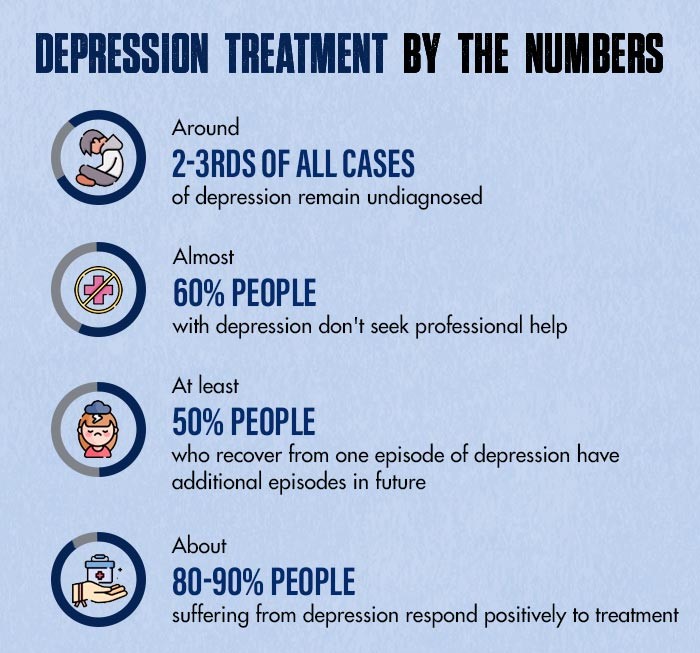
Self-Care Strategies For Depression
Several self-care strategies [mfn] Duggal H. S. (2019). Self-Management of Depression: Beyond the Medical Model. The Permanente journal, 23, 18-295. https://doi.org/10.7812/TPP/18-295 [/mfn] can be used to enhance chances of recovery along with treatment for depression or prevent the development of depressive symptoms altogether.
In fact, most people prefer depression treatment without medication—sometimes due to the stigma attached to psychiatric pharmacology, at other times to avoid the side effects that come with medicine consumption.
Consider the following natural treatment for depression:
- Follow a well-balanced diet
- Maintain a healthy sleep regime
- Limit consumption of sugary foods, deep-fried foods, refined and processed foods, etc.
- Avoid consumption of alcohol, tobacco, drugs, etc.
- Get adequate exercise
- Consider stress-management and mindfulness-based techniques like meditation, yoga, etc.
- Strike a sound work-life balance
- Consider hobbies (like journaling, gardening, hiking, volunteering, etc.)
- Join a support group
- Spend quality time with your loved ones
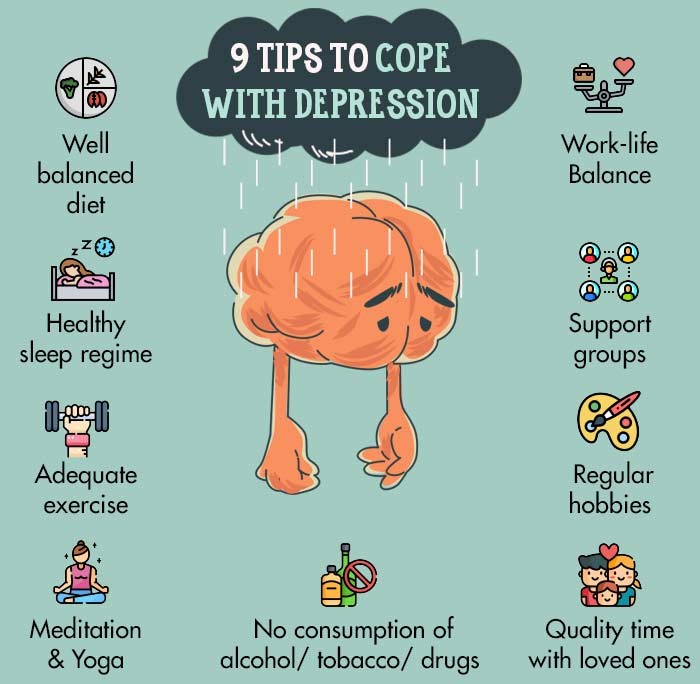
How To Help Someone With Depression
While depression is undoubtedly challenging for the person dealing with its symptoms, it can be quite difficult for people around them as well. When it comes to extending a helping hand, most people are often at a loss. This can end up making things worse for the suffering person and negatively impact their relationships too.
In case your friend, partner, child, or family member is suffering from depression, here are some tips for you to offer them support while taking care of your own self:
- Encourage them to seek professional help and help them adhere to their treatment regime.
- Try to listen to them and acknowledge their feelings, even if they may not make sense to you.
- Depression may manifest itself differently in children and adolescents. If your child seems irritable and has been showing a lack of interest in play, it might be good to check on them and be attentive to their concerns instead of scolding them as that might have a counterproductive effect.
- Although it can be difficult to feel your partner or loved one slipping away from you because of depression, try not to blame yourself or hold yourself responsible for how they feel.
- Let them know that you are there for them and would continue to love and support them.
- Make sure you take some time to engage in self-care and activities that give you a sense of pleasure. If required, do not hesitate to seek help for yourself as well.
Takeaway
Depression can be a debilitating psychiatric condition. But, with early identification and right treatment for depression one can fully recover from the condition. As depressive disorders can affect each person differently, it is crucial that the right treatment plan is devised, suited to the patient’s unique symptoms.
Moreover, the recovery time may also vary for each individual—depending on the symptoms severity, comorbid conditions, treatment compliance, and lifestyle. Nonetheless, having patience, hope, and discipline throughout and after the treatment process can lead to improved symptoms and full recovery.
At A Glance
- Depression can be a crippling mental health disorder, that affects your life, well-being, and relationships.
- It can be effectively managed with several treatment options.
- Treatment for depression primarily involves psychotherapy and medication.
- Depression treatment also includes self-help coping strategies like herbal remedies, journaling, exercising, etc.
- Having patience and discipline throughout and after the treatment process can lead to improvement in symptoms and a full recovery.
Frequently Asked Questions (FAQs)
1. What is the best treatment for depression?
A combination of psychotherapy and medication is considered the best treatment for depression.
2. Can depression be cured without medication?
People with mild to moderate depressive symptoms can be treated with psychotherapy, without the help of medication. However, severe forms of depression require mandatory pharmacotherapy and sometimes, hospitalization.
3. What is self-treatment for depression?
Self-help activities like physical exercise, meditation, yoga, etc. can be used to cope with depressive symptoms. However, it is always advisable to ask for professional help.
4. What is an intensive treatment for depression?
A new type of psychotherapy called “intensive outpatient therapy [mfn] Treatment, C. for S. A. (2006). Chapter 8. Intensive Outpatient Treatment Approaches. In www.ncbi.nlm.nih.gov. Substance Abuse and Mental Health Services Administration (US). Available from: https://www.ncbi.nlm.nih.gov/books/NBK64102/ [/mfn]” (comprising residential or outpatient mental health programs) has recently come into use as an intensive treatment for depression.
5. What is the psychedelic treatment for depression?
Psychedelic treatment for depression involves prescribing psilocybin [mfn] Vargas, A. S., Luís, Â., Barroso, M., Gallardo, E., & Pereira, L. (2020). Psilocybin as a New Approach to Treat Depression and Anxiety in the Context of Life-Threatening Diseases-A Systematic Review and Meta-Analysis of Clinical Trials. Biomedicines, 8(9), 331. https://doi.org/10.3390/biomedicines8090331 [/mfn] to adult patients with major depressive disorder (MDD) for decreasing the symptoms.
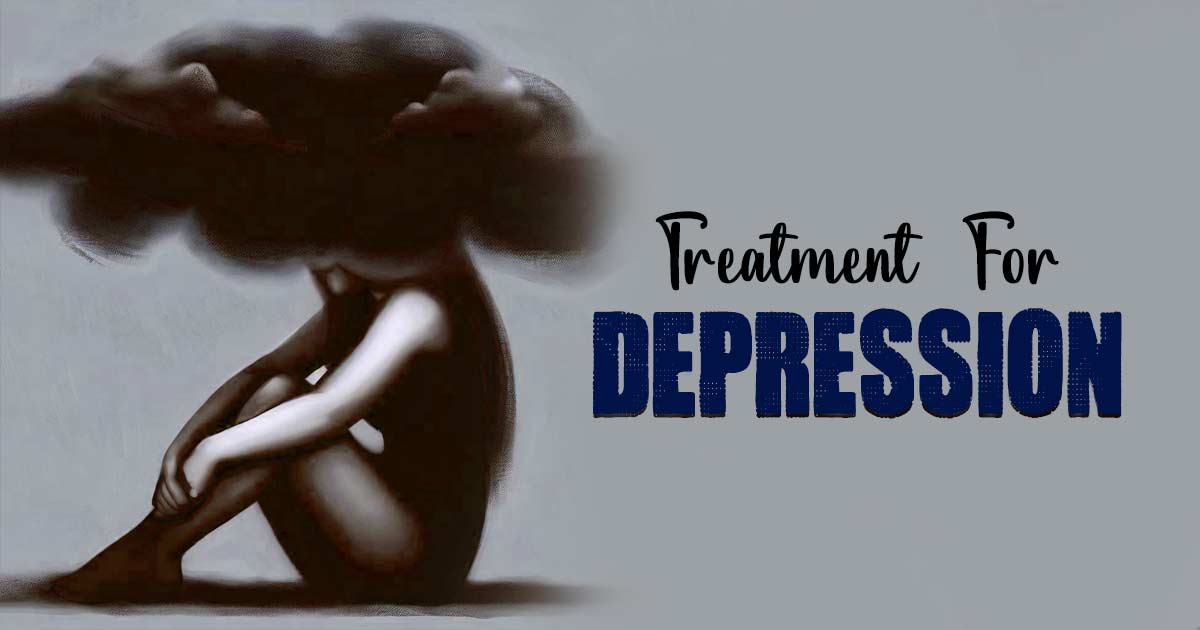
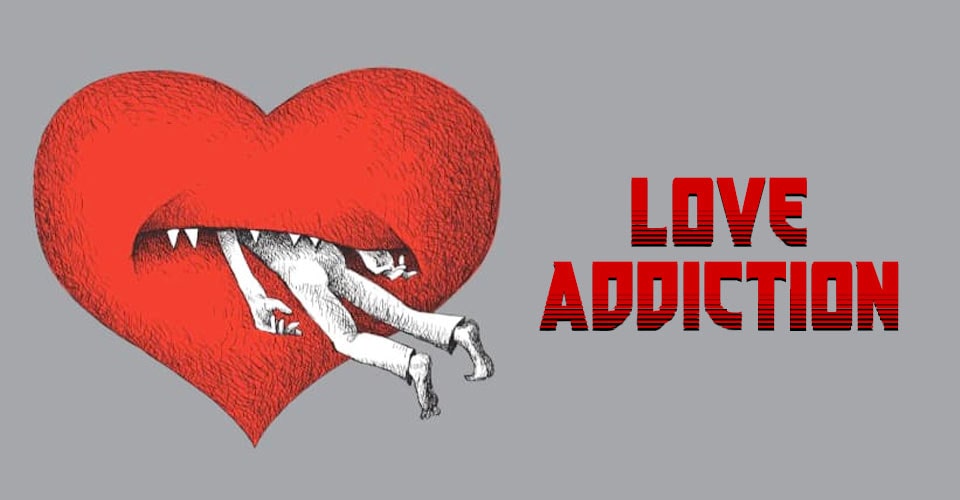
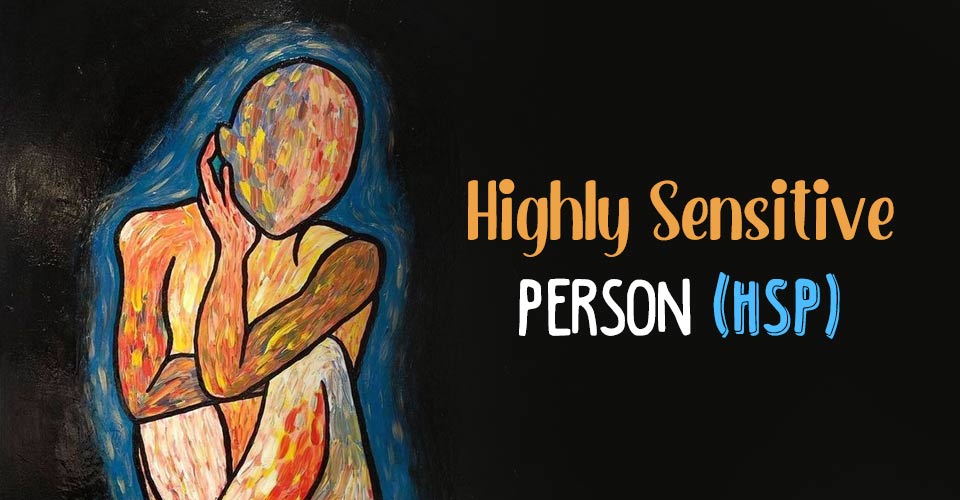

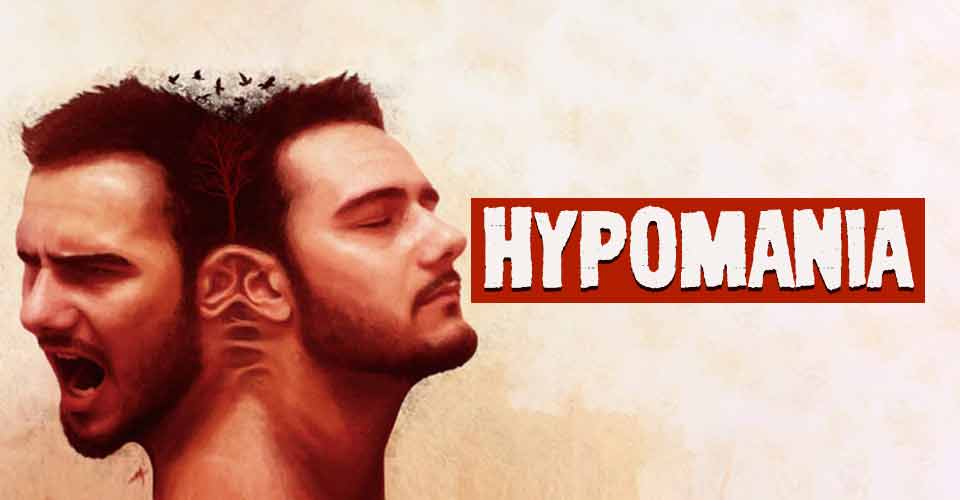



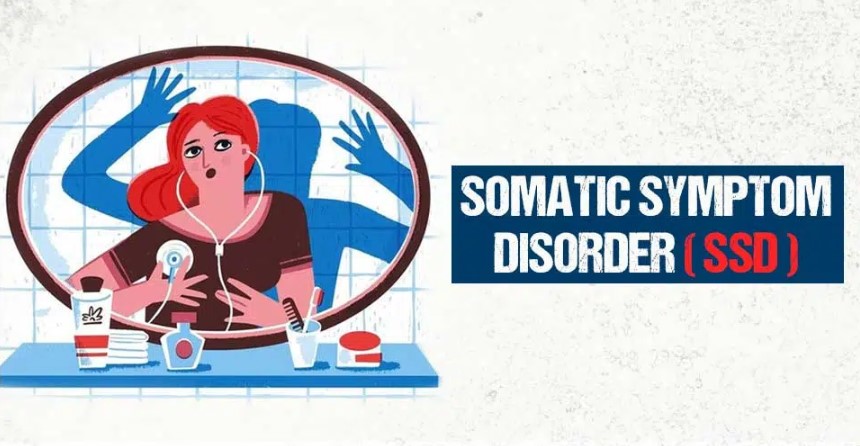

Leave a Reply